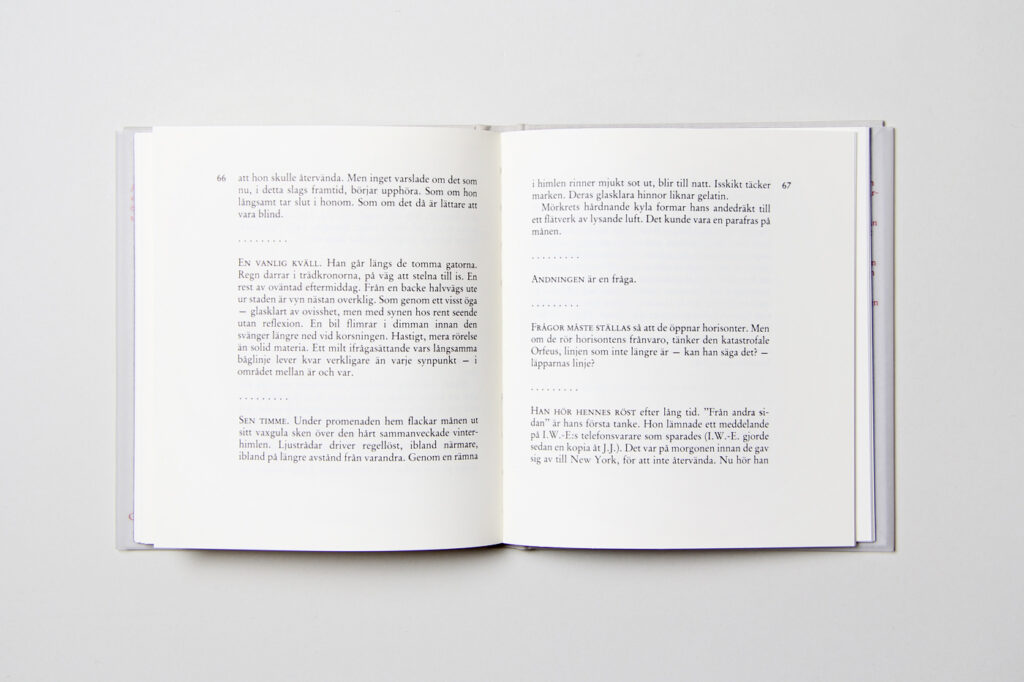




Delandets bok:
The Book of Imparting
Information · Cover · Reviews
Information
Prose poetry · In Swedish · Stockholm: Norstedts, 1991, 105 pages · Cover: Håkan Rehnberg · ISBN: 91-1-911342-0 · English language rights available
Cover
In 1988, the friend of the author was killed in a traffic accident caused by a drunk driver. Written in the aftermath, The Book of Imparting attempts to circumscribe the absence left behind by the beloved.
The text is organized into a series of short sequences — in style situated between prose and poetry, story and diary-like fragment, reflection and dream — which both capture the past prior to the accident and chronicle the period afterward. Written in the third person singular and arranged around a reading of Andrew Marvell’s poem “The Definition of Love,” the book documents a labor of mourning, but also reflects on the interrelationship between love, language, and recollection. The tone is dry but elegant, precise yet searching, never succumbing to pathos, though open and aching alike. Aware of the futility in attempting to make the lost one present again by addressing her, thus confusing the person with her name, the narrator tries rather to maintain, describe, and finally comprehend the sensation of loss itself. This is an archaeology of the present, unfolding in close scrutiny of literary texts and personal reminiscences. Absence here acquires a tangible intensity, as it slowly seems to fuse with the narrator’s awareness that he will never be able to fathom what happened.
Ultimately, the emblem of his labor remains the No of negation. Yet a no, too, makes something happen. In the best of cases, the narrator may recapture the moment of disappearance. The Book of Imparting contains the record of this experience.
Reviews
“Rarely have I . . . experienced the problematization of fiction in a manner more concrete than this. Fioretos has a lot to live up to, and he does . . . In particular, he demonstrates how language itself may become the primary instrument of the lack of language; language revolves around an elusive center, a turning that in its very labor points to the missing core that is more palpable than any attempt to express it. When absence is present it is neither absence nor presence, but something third. Inexpressible.” — Jan Arnald, Idag
“That Fioretos deals with a personal tragedy does not diminish the fact that he may have written what is the most gifted first book this year.” — Ulf Bergström, Bonniers Litterära Magasin
“The Book of Imparting is a lyrical labor with language, its meanings and shades, but also the difficult attempt to recall, in writing, someone who cannot be regained . . . the traces of a person whose traits are dissolving. . . . The Book of Imparting contains a seriousness which is moving and at times very beautiful.” — Tomas Löthman, Norrbottenskuriren
“Its language is beautiful, naked, without ever exposing. . . . Aris Fioretos’ book immediately receives a special place in my heart.” — Åsa Strandberg, Helsingborgs Dagblad
“The severe beauty of linguistic awareness illuminates many of these notes, written by an Orpheus poking in the ashes after an extinguished fire. . . . With The Book of Imparting, Fioretos has written with daring and ‘untimeliness.’ He knows what remains after fire are merely ashes, traces lingering only in memory.” — Thomas Forser, Göteborgs—Posten
“The book of memory thus becomes a book of forgetting. It does not retain the beloved, but the despair that ensues from the loss, and thus only indirectly herself. She exists in the intensity with which she is missed. . . . In the negative of a portrait that Aris Fioretos offers, she appears anything but dead.” — Karl-Erik Lagerlöf, Dagens Nyheter
“. . . a beautiful book, and hard to endure.” — Gunnar Nirstedt, Östgöta-Correspondenten
“This is . . . a masterful book, a text which eludes almost all normative evaluation, and thus it seems meaningless to classify it in terms of ‘good’ or ‘bad.’ It is a book living contained in its own singular space.” — Anders Paulrud, Aftonbladet